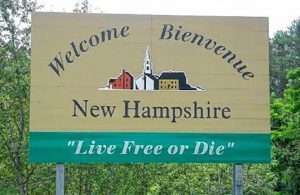The Volokh Conspiracy
Mostly law professors | Sometimes contrarian | Often libertarian | Always independent
Podcast on New Hampshire v. Massachusetts
I was interviewed by Joe Salvetta of the Pioneer Institute, a leading Massachusetts public policy think tank.

The Pioneer Institute for Public Policy Research recently put up a podcast in which Joe Selvaggi of the Institute interviewed me about New Hampshire v. Massachusetts. This is an important case currently before the Supreme Court, in which New Hampshire is challenging the constitutionality of Massachusetts' policy of imposing income taxes on New Hampshire residents working remotely for Massachusetts firms during the Coronavirus pandemic. The case raises issues about the scope of a state's power to tax non-residents that go far beyond the specific circumstances of the pandemic.
The podcast is available here. I previously wrote about New Hampshire v. Massachusetts here and here.
Editor's Note: We invite comments and request that they be civil and on-topic. We do not moderate or assume any responsibility for comments, which are owned by the readers who post them. Comments do not represent the views of Reason.com or Reason Foundation. We reserve the right to delete any comment for any reason at any time. Comments may only be edited within 5 minutes of posting. Report abuses.
Please to post comments


Looking at the National guard units, my money is on Vermont.
OK, short naps are great, but you miss a lot.
This actually is a major Red State/Blue State issue because the Blue States think that *everyone* should be taxed and that it isn't fair that some people aren't.
It's the same issue with the Portsmouth Naval Shipyard, which technically is in Maine. Massachusetts doesn't do this, but Maine has a graduated income tax which counts the spouse's income as well.
Conversely, a shipyard worker living in Massachusetts (and some do, NH only has 18 miles of coastline) receives a credit against his Mass taxes for what he paid to Maine.
And it's a political issue because a good portion of the Bite Me Bailout is intended to bail out Blue States, not provide Covid relief. The elimination of SALT was part of this Red/Blue battle, and it likely will be restored -- and then again removed in 2022.
Professor Somin: I read (and re-read) both of your posts, and listened to the podcast. Interesting case. Has a lot of implications, going forward.
If MA's arguments prevail, what happens when a resident who works remotely at home in state A, for a company in state B, and there is no reciprocal tax agreement between state A and state B? This resident gets taxed twice on their income, no?
That can't be legal, can it?
Arguably, that is already happening to every NH resident working in MA because MA uses the state income tax to subsidize (lower) the property tax. I say subsidize because Proposition 2 1/2 limited property taxes, with the state responding by massively increasing municipal aid.
So the NH resident is paying *both* MA income tax and a higher NH property tax.
I think NH could have settled it by withholding access to NH liquor stores for Mass residents. (just kidding.)
"Don't evah joke about mah liquah!"
Interesting story there -- MA put MA troopers in the parking lot of NH liquor stores to keep track of what people with MA plates were buying, with the MA DOR then sending the registered owner a bill for the MA tax on what they had bought.
NH wound up literally arresting the MA troopers.